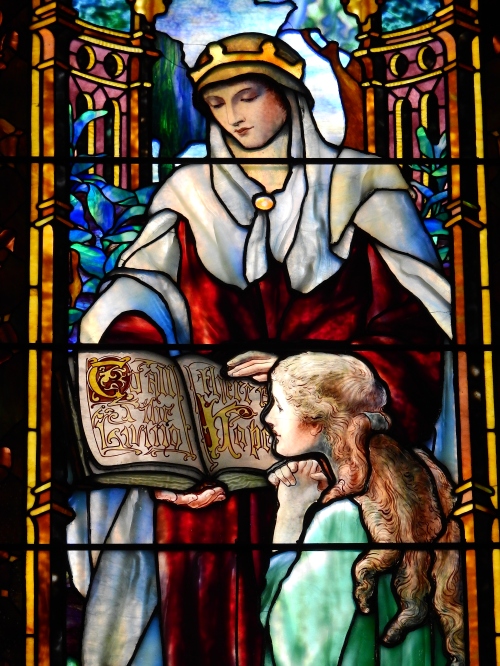
As noted on its website, the church currently known as Faith United Parish is home to a number of beautiful stained glass windows. Located on Main Street in the city of Fitchburg, Massachusetts, both the building and its congregation have evolved over time and continue to do so. Originally known in the 1800s as the Calvinistic Congregational Church, it merged with the First United Methodist Church in 1967, forming an urban cooperative ministry.

The building, which was to be the third meeting house for this congregation, was designed in 1897 by architect and parishioner H. M. Francis who was influenced by the Romanesque Revival sparked by Henry Hobson Richardson with his creation of Trinity Church in the City of Boston. Standing outside the building on the corner of Main and Rollstone streets, one is immediately struck by the heavy stone facade, rounded arches, tall tower with its beautiful clock, and dark tracery of the interior stained glass windows. Thanks to Pastor Jeff Conlon who allowed entry inside to see the windows firsthand.

The rose window was designed by the Boston firm of Redding, Baird and Company. It measures twenty feet in diameter and its theme is the angelic choir.

The six angels are the spirits of Praise, with scroll; Love, holding the sacred dove, Music, blowing the trumpet, Music, playing the harp, Teaching, reading from the Book of Life, and the herald-angel of Easter morning.





The description of the rose window is taken from the 1902 book, A History of the Calvinistic Congregational Church and Society, Fitchburg, Massachusetts. In 1902, there were only two memorial stained glass windows in place, one given by Edward G. Bailey in memory of his mother Mrs. Rodney Wallace …

Dorcas
and the other given by George Hildreth in memory of his wife Pauline C. Hildreth.

These windows, plus three others added in 1903, are credited as Tiffany Studio windows designed by artist Frederick Wilson.

While not widely known today, Frederick Wilson was a major ecclesiastical designer of the late 19th and early 20th centuries. He was employed most notably by Tiffany for nearly thirty years and worked for other studios at the same time including Heaton, Butler and Bayne.

Resurrection Angel

Call of Matthew

Call of Matthew
Two other figurative windows are present though not necessarily attributed to Tiffany or Wilson.

While the above window does have similar opalescent and drapery glass as the Tiffany windows, the final window I photographed is strikingly different.

A 1938 article in the Fitchburg Sentinel newspaper references this window, the Gifford Memorial window, as having been gifted to the church during the prior ten years. By the 1920s there was a distinct move away from the opalescence and designs that Tiffany and John La Farge had made famous. The use of rich colors and a reworking of the medieval inspired a new generation of artists. As for the name of this artist and his or her studio it is unclear without further research.

While my focus tends to be stained glass, there were many other beautiful features to be seen inside as well as without, and I’m not the only one who thinks so. The building is considered one of the most important examples of Richardsonian architecture remaining. In 1979, the building was enrolled in the registry of National Historic Places. You can learn more about this important building and its church services via the following link. It was a great pleasure to visit. http://www.faithunitedparish.com/index.htm
Sources & Additional Reading
https://en.wikipedia.org/wiki/Calvinistic_Congregational_Church
Leave a comment